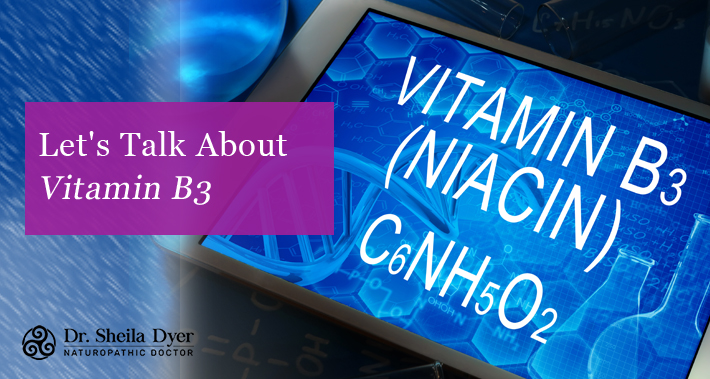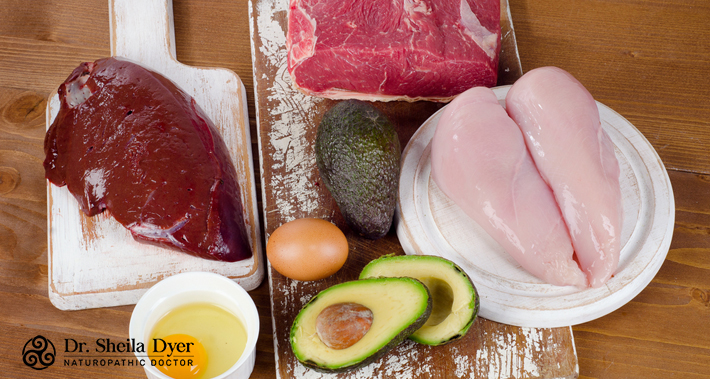Vitamin B3 is vital for your overall health.
While a deficiency is very rare in most developed countries, it’s good to understand vitamin B3 to ensure you’re receiving the full benefits of the vitamin.
A naturopathic doctor in Toronto is a great resource to help ensure that you are getting the appropriate amount of vitamin B3 and any other vitamin your body is needing.
Even if that’s as simple as picking the best vitamin B complex that is right for your body.
Because any B complex vitamin supplement will have vitamin B3 in it, you’ll be covered for all your vitamin B3 needs with a B complex supplement, right?
Not necessarily.
Let’s take a closer look at vitamin B3
What Is Vitamin B3?
Vitamin B3, also called niacin, is one of eight B vitamins.
The other B vitamins are B1, B2, B5, B6, B7, B9, and B12.
What happened to B4, B8, B10, and B11?
B4 – adenine – is an amino acid.
B8 – inositol – is a form of glucose.
B10 – para-aminobenzoic acid, or PABA – is a chemical substance best known as an ingredient in sunscreens.
B11 – salicylic acid – is an organic compound best known as an ingredient in skin care products.
Each of these was once considered a B vitamin, but later research found that they’re not actually vitamins.
That doesn’t mean they’re bad for you – quite the opposite in some cases – but they’re not considered vitamins anymore.
Anyway, vitamin B3 has two main chemical forms, nicotinamide and nicotinic acid.
Both of these are water soluble.
This means that your body doesn’t store it, and that your body will excrete any excess amounts.
You can get vitamin B3 in food, and your body also makes small amounts of it from the amino acid tryptophan.
Benefits Of Vitamin B3
Vitamin B3, along with the other B vitamins, helps to convert food into energy by aiding digestive enzymes.
It also plays a role in cell signaling, and the making and repairing of your DNA.
Plus, it acts as an antioxidant, along with vitamin C and vitamin E.
You can see why vitamin B3 is important for your general health, because it helps with so many body processes.
Let’s explore some of the most important benefits of vitamin B3 below.
1. It’s Good For Your Brain
Your brain needs vitamin B3 to get energy and function properly.
In addition, vitamin B3 works to reduce the damage to your brain cells that can occur as a result of a deficiency.
In an extreme case, a 2012 case study of a patient brought to a psychiatric hospital outlines his “disorderly behavior” being the cause of his hospitalization, when it turns out he was just deficient in vitamin B3.
After receiving the appropriate treatment, he made a full recovery.
2. It Can Help Reduce Your Risk Of Atherosclerosis
Studies have shown that Vitamin B3 can help to reduce your risk of atherosclerosis, which is the build up of fats, cholesterol, and other substances in your artery walls.
As you can imagine, this is very helpful for reducing your risk of cardiovascular disease.
And because cardiovascular disease is the second leading cause of death in Canada (cancer is the first), this is good news.
3. It Can Help Lower LDL Cholesterol
Another benefit is that vitamin B3 can help to lower LDL cholesterol.
This is important because high levels of LDL cholesterol can lead to a buildup of cholesterol in your arteries.
This increases your risk of having a heart attack and other heart disease issues.
Studies have shown that vitamin B3 significantly reduces LDL cholesterol.
4. It Can Help Increase HDL Cholesterol
Vitamin B3 also raises HDL cholesterol while lowering LDL cholesterol, which is a great benefit.
While LDL cholesterol is known as “bad” cholesterol, HDL is known as “good” cholesterol.
This is because HDL actually moves cholesterol to your liver where it’s processed and excreted from your body.
LDL, on the other hand, builds up in your arteries.
The same study linked in the above point has shown that by raising HDL cholesterol, vitamin B3 reduces your risks of cardiovascular disease and heart attacks.
5. It Can Reduce Your Risk Of Skin Cancer
Finally, vitamin B3 in its nicotinamide form can also reduce your risk of skin cancer by protecting skin cells from sun damage.
A 2015 study found that taking nicotinamide orally reduced the development of two particular types of skin cancer, basal cell carcinoma and squamous cell carcinoma, by 23%.
More research needs to be done in this realm, but it seems promising.
Other Benefits
In addition to these benefits, vitamin B3 has also been shown to help as a treatment for type 1 diabetes by protecting your insulin-creating cells.
Plus, it’s been shown to help reduce symptoms of arthritis by improving joint mobility, and reducing the need for non steroidal anti-inflammatory drugs.
Dietary Sources Of Vitamin B3
Vitamin B3 can be found in many foods including meat, poultry, fish, eggs, and greens.
You can also find many products fortified with vitamin B3 like bread, breakfast cereals, and milk.
Symptoms Of Vitamin B3 Deficiency
Vitamin B3 deficiency leads to a condition called pellagra.
Symptoms of pellagra include:
- Chronic fatigue
- Memory loss and mental confusion
- Depression
- Diarrhea
- Skin conditions
- Headaches
When there is a severe deficiency, pellagra can develop which can be life threatening if not addressed.
But, it’s important to note that pellagra is very rare in Canada.
If you’re experiencing the above symptoms, it’s more likely that the cause is something else.
Book Your Appointment With Dr. Sheila Dyer, ND, Today
To conclude, the good news is that for those of us who live in Canada, we’re most likely not vitamin B3 deficient.
That being said, there’s definitely an optimal amount you’ll want to have for your body.
And if you are experiencing any vitamin B3 deficiency symptoms, it’s possibly the result of a deficiency with another vitamin.
I can help.
Book an appointment today with me, Dr. Sheila Dyer, ND.
I look forward to working with you and optimizing your complete health, naturally.
If you have questions about naturopathic medicine, or would like to start with your first consultation, contact me, and let’s book an appointment.
Dr. Sheila Dyer, ND1080 Dovercourt Rd,
Toronto, ON M6H 2X8
(416) 554-5135
► https://g.page/DrSheilaDyerNd
Dr. Sheila Dyer is a Naturopathic Doctor and a practicing registered nurse offering holistic healthcare with a scientific focus

